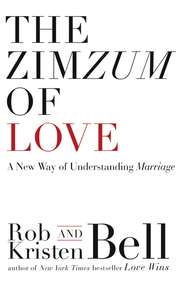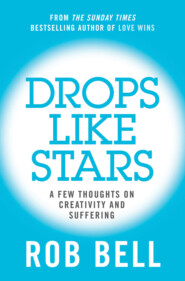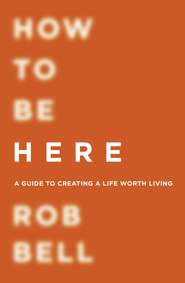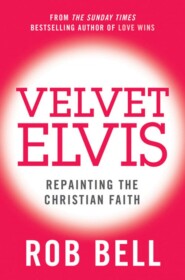По всем вопросам обращайтесь на: info@litportal.ru
(©) 2003-2024.
✖
What We Talk About When We Talk About God
Автор
Год написания книги
2018
Настройки чтения
Размер шрифта
Высота строк
Поля
What We Talk About When We Talk About God
Rob Bell
Rob Bell’s bestselling book Love Wins struck a powerful chord with a new generation of Christians who are asking the questions church leaders have been afraid to touch. His new book, What We Talk About When We Talk About God, continues down this path, helping us with the ultimate big-picture issue: how do we know God?Love Wins was a Sunday Times bestseller that created a media storm, launching Bell as a national religious voice who is reinvigorating what it means to be religious and a Christian today.He is one of the most influential voices in the Christian world, and now his new book, What We Talk About When We Talk About God, is poised to blow open the doors on how we understand God.Bell believes we need to drop our primitive, tribal views of God and instead understand the God who wants us to become who we were designed to be, a God who created a universe of quarks and quantum string dynamics, but who also gives meaning to why new-born babies and stories of heroes and sacrifice inspire in us a deep reverence.What We Talk About When We Talk About God will reveal that God is not in need of repair to catch him up with today’s world so much as we need to discover the God who goes before us and beckons us forward.A book full of mystery, controversy, and reverence, What We Talk About When We Talk About God has fans and critics alike anxiously awaiting, and promises not to disappoint.
EPIGRAPH (#ulink_7c090d5f-0ca7-55bf-853b-c59b6e414299)
Like all great things in the world, women and religion and the sky . . . you wonder about it, and you don’t stop wondering about it.
—Tom Waits
CONTENTS
EPIGRAPH
CHAPTER 1 - HUM
CHAPTER 2 - OPEN
CHAPTER 3 - BOTH
CHAPTER 4 - WITH
CHAPTER 5 - FOR
CHAPTER 6 - AHEAD
CHAPTER 7 - SO
EPILOGUE
RESOURCES, NODS, NOTES, AND A FEW SHOUT-OUTS
ACKNOWLEDGMENTS
ABOUT THE AUTHOR
ALSO BY ROB BELL
CREDITS
BACK AD
COPYRIGHT (#litres_trial_promo)
ABOUT THE PUBLISHER
CHAPTER 1 (#ulink_c8155752-f3ba-51af-921d-811f6fa1b4a7)
HUM (#ulink_c8155752-f3ba-51af-921d-811f6fa1b4a7)
I realize that when I use the word God in the title of this book there’s a good chance I’m stepping on all kinds of land mines. Is there a more volatile word loaded down with more history, assumptions, and expectations than that tired, old, relevant, electrically charged, provocative, fresh, antiquated yet ubiquitous as ever, familiar/unfamiliar word God?
And that’s why I use it.
From people risking their lives to serve the poor because they believe God called them to do it, to pastors claiming that the latest tornado or hurricane or earthquake is God’s judgment, to professors proclaiming that God has only ever been a figment of our imagination, to people in a recovery meeting sitting in a circle drinking bad coffee and talking about surrendering to a higher power, to musicians in their acceptance speech at an awards show thanking God for their hit song about a late-night booty call, when it comes to God, we are all over the place.
Like a mirror, God appears to be more and more a reflection of whoever it is that happens to be talking about God at the moment.
And then there are the latest surveys and polls, the ones telling us how many of us believe and don’t believe in God and how many fewer of us are going to church, inevitably prompting experts to speculate about demographics and technology and worship style and this generation versus that generation, all of it avoiding the glaring truth that sits right there elephant-like in the middle of the room.
The truth is, we have a problem with God.
It’s not just a problem of definition—what is it we’re talking about when we talk about God?—and it’s not just the increasing likelihood that two people discussing God are in fact talking about two extraordinarily different realities while using the exact same word.
This problem with God goes much, much deeper.
As a pastor over the past twenty years, what I’ve seen again and again is people who want to live lives of meaning and peace and significance and joy—people who have a compelling sense that their spirituality is in some vital and yet mysterious way central to who they are—but who can’t find meaning in the dominant conceptions, perceptions, and understandings of God they’ve encountered. In fact, those conceptions aren’t just failing them but are actually causing harm.
We’re engaged more than ever by the possibilities of soul and spirit, and by the nagging suspicion that all of this may not be a grand accident after all; but God, an increasing number of people are asking—what does God have to do with that?
I’ve written this book about that word, then, because there’s something in the air, we’re in the midst of a massive rethink, a movement is gaining momentum, a moment in history is in the making: there is a growing sense among a growing number of people that when it comes to God, we’re at the end of one era and the start of another, an entire mode of understanding and talking about God dying as something new is being birthed.
There’s an ancient story about a man named Jacob who had a magnificent dream, and when he wakes up he says, “Surely God was in this place, and I, I wasn’t aware of it.”
Until now.
The power of the story is its timeless reminder that God hasn’t changed; it’s Jacob who wakes up to a whole new awareness of who—and where—God is.
Which brings me back to this moment, to the realization among an increasing number of people that we are waking up in new ways to the God who’s been here the whole time.
I’m aware, to say the least, that talking about this and writing a book about it, naming it and trying to explain it and taking a shot at describing where it’s all headed, runs all sorts of risks.
I get that.
We’re surrounded by friends and neighbors and family and intellectual and religious systems with deeply held, vested interests in the conventional categories and conceptions of belief and denial continuing to remain as entrenched as those traditional conceptions are. There are, as they say, snipers on every roof. And being controversial isn’t remotely interesting.
But love and meaning and joy and hope?
That’s compelling.
That’s what I’m after.
That’s worth the risk.
The great German scholar Helmut Thielicke once said that a person who speaks to this hour’s need will always be skirting the edge of heresy, but only the person who risks those heresies can gain the truth.
And the truth is, we have a problem—we have a need—and there’s always the chance that this may in fact be the hour.
First, then, a bit more about this God problem . . .
Rob Bell
Rob Bell’s bestselling book Love Wins struck a powerful chord with a new generation of Christians who are asking the questions church leaders have been afraid to touch. His new book, What We Talk About When We Talk About God, continues down this path, helping us with the ultimate big-picture issue: how do we know God?Love Wins was a Sunday Times bestseller that created a media storm, launching Bell as a national religious voice who is reinvigorating what it means to be religious and a Christian today.He is one of the most influential voices in the Christian world, and now his new book, What We Talk About When We Talk About God, is poised to blow open the doors on how we understand God.Bell believes we need to drop our primitive, tribal views of God and instead understand the God who wants us to become who we were designed to be, a God who created a universe of quarks and quantum string dynamics, but who also gives meaning to why new-born babies and stories of heroes and sacrifice inspire in us a deep reverence.What We Talk About When We Talk About God will reveal that God is not in need of repair to catch him up with today’s world so much as we need to discover the God who goes before us and beckons us forward.A book full of mystery, controversy, and reverence, What We Talk About When We Talk About God has fans and critics alike anxiously awaiting, and promises not to disappoint.
EPIGRAPH (#ulink_7c090d5f-0ca7-55bf-853b-c59b6e414299)
Like all great things in the world, women and religion and the sky . . . you wonder about it, and you don’t stop wondering about it.
—Tom Waits
CONTENTS
EPIGRAPH
CHAPTER 1 - HUM
CHAPTER 2 - OPEN
CHAPTER 3 - BOTH
CHAPTER 4 - WITH
CHAPTER 5 - FOR
CHAPTER 6 - AHEAD
CHAPTER 7 - SO
EPILOGUE
RESOURCES, NODS, NOTES, AND A FEW SHOUT-OUTS
ACKNOWLEDGMENTS
ABOUT THE AUTHOR
ALSO BY ROB BELL
CREDITS
BACK AD
COPYRIGHT (#litres_trial_promo)
ABOUT THE PUBLISHER
CHAPTER 1 (#ulink_c8155752-f3ba-51af-921d-811f6fa1b4a7)
HUM (#ulink_c8155752-f3ba-51af-921d-811f6fa1b4a7)
I realize that when I use the word God in the title of this book there’s a good chance I’m stepping on all kinds of land mines. Is there a more volatile word loaded down with more history, assumptions, and expectations than that tired, old, relevant, electrically charged, provocative, fresh, antiquated yet ubiquitous as ever, familiar/unfamiliar word God?
And that’s why I use it.
From people risking their lives to serve the poor because they believe God called them to do it, to pastors claiming that the latest tornado or hurricane or earthquake is God’s judgment, to professors proclaiming that God has only ever been a figment of our imagination, to people in a recovery meeting sitting in a circle drinking bad coffee and talking about surrendering to a higher power, to musicians in their acceptance speech at an awards show thanking God for their hit song about a late-night booty call, when it comes to God, we are all over the place.
Like a mirror, God appears to be more and more a reflection of whoever it is that happens to be talking about God at the moment.
And then there are the latest surveys and polls, the ones telling us how many of us believe and don’t believe in God and how many fewer of us are going to church, inevitably prompting experts to speculate about demographics and technology and worship style and this generation versus that generation, all of it avoiding the glaring truth that sits right there elephant-like in the middle of the room.
The truth is, we have a problem with God.
It’s not just a problem of definition—what is it we’re talking about when we talk about God?—and it’s not just the increasing likelihood that two people discussing God are in fact talking about two extraordinarily different realities while using the exact same word.
This problem with God goes much, much deeper.
As a pastor over the past twenty years, what I’ve seen again and again is people who want to live lives of meaning and peace and significance and joy—people who have a compelling sense that their spirituality is in some vital and yet mysterious way central to who they are—but who can’t find meaning in the dominant conceptions, perceptions, and understandings of God they’ve encountered. In fact, those conceptions aren’t just failing them but are actually causing harm.
We’re engaged more than ever by the possibilities of soul and spirit, and by the nagging suspicion that all of this may not be a grand accident after all; but God, an increasing number of people are asking—what does God have to do with that?
I’ve written this book about that word, then, because there’s something in the air, we’re in the midst of a massive rethink, a movement is gaining momentum, a moment in history is in the making: there is a growing sense among a growing number of people that when it comes to God, we’re at the end of one era and the start of another, an entire mode of understanding and talking about God dying as something new is being birthed.
There’s an ancient story about a man named Jacob who had a magnificent dream, and when he wakes up he says, “Surely God was in this place, and I, I wasn’t aware of it.”
Until now.
The power of the story is its timeless reminder that God hasn’t changed; it’s Jacob who wakes up to a whole new awareness of who—and where—God is.
Which brings me back to this moment, to the realization among an increasing number of people that we are waking up in new ways to the God who’s been here the whole time.
I’m aware, to say the least, that talking about this and writing a book about it, naming it and trying to explain it and taking a shot at describing where it’s all headed, runs all sorts of risks.
I get that.
We’re surrounded by friends and neighbors and family and intellectual and religious systems with deeply held, vested interests in the conventional categories and conceptions of belief and denial continuing to remain as entrenched as those traditional conceptions are. There are, as they say, snipers on every roof. And being controversial isn’t remotely interesting.
But love and meaning and joy and hope?
That’s compelling.
That’s what I’m after.
That’s worth the risk.
The great German scholar Helmut Thielicke once said that a person who speaks to this hour’s need will always be skirting the edge of heresy, but only the person who risks those heresies can gain the truth.
And the truth is, we have a problem—we have a need—and there’s always the chance that this may in fact be the hour.
First, then, a bit more about this God problem . . .











